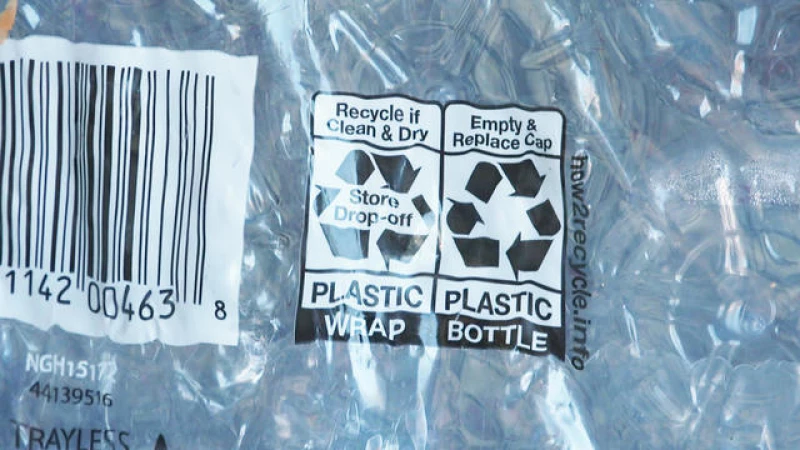Jan Dell, a former chemical engineer, has dedicated years to spreading an inconvenient truth about plastics. "Many people see the recyclable label and toss it in the recycle bin," she explained. "But the reality is, the vast majority of plastics are not recycled."
Every year, the U.S. generates about 48 million tons of plastic waste, but only 5 to 6 percent of it is actually recycled, as reported by the Department of Energy. The remaining waste either ends up in landfills or is incinerated.
To combat plastic pollution, Dell established a non-profit organization called The Last Beach Cleanup. Inside her garage in Southern California, various plastics with recycling symbols are stored, giving the impression that they can be recycled. However, Dell emphasized, "It's a deception."
The familiar chasing arrows, introduced on plastic products in 1988, were part of an effort to assure the public that plastic waste could be recycled without issue.
Davis Allen, an investigative researcher at the Center for Climate Integrity, pointed out that the industry didn't necessarily require recycling to be effective: "Their goal was for people to believe that it was effective," he stated.
An investigative study titled "Unveiling the Deception Behind Plastic Recycling," has exposed the plastics industry for engaging in a prolonged scheme to deceive the public regarding the feasibility of plastic recycling. Despite being aware of the technical and economic constraints that render large-scale plastic recycling unattainable, the industry has persistently misled the public.
"While they couldn't deny the existence of plastic waste," remarked Allen, "they fabricated a narrative about how recycling could resolve the issue."
Tracy questioned, "If plastic recycling is indeed challenging from a technical standpoint and lacks economic viability, why has the plastics sector advocated for it?"
"The plastics industry recognizes that promoting recycling translates to selling more plastic, and they are willing to disseminate any information necessary to perpetuate this cycle," responded Allen. "It's all about profits."
Plastic, derived from oil and gas, exists in numerous forms, the majority of which are incompatible for simultaneous recycling. In response to certain municipalities considering bans on plastic products in the 1980s, the industry began advocating for recycling as a solution.
Allen presented documents and meeting records obtained from public archives and a former American Plastics Council staff member. "The evidence within these materials clearly indicates a widespread acknowledgment that plastics recycling was ineffective," he stated.
During a trade conference in Florida in 1989, a prominent industry figure informed attendees, "Recycling is not a sustainable practice and does not resolve the issue of solid waste."
Back in 1994, an Exxon executive candidly admitted to the staff of the plastics council that their commitment to recycling was more about the activities than the actual results.
According to Allen, there was a perception within the industry that recycling was more of a public relations issue rather than a technical challenge that needed solving.
Recently, the industry rolled out a new ad campaign called "Recycling is real" and claimed to be investing in advanced recycling technology.
The American Chemistry Council
Jan Dell remains skeptical about the true recyclability of plastic, stating, "It's the same process they were trying 30 years ago, and my response to that is, it's science fiction."
With plastic production projected to triple by 2050 and plastic waste accumulating on land and in oceans, over 170 countries are collaborating on a United Nations treaty to combat plastic pollution.
- U.N. taking first step toward "historic" treaty on pollution from plastics, including "epidemic" of plastic trash
In a letter addressed to President Biden regarding the treaty negotiations, the plastics industry expressed opposition to bans on plastic production but voiced support for increased recycling efforts.
Responding to the plastics industry's claims of recycling, Dell retorted, "The only thing the plastics industry has actually recycled is their lies over and over again."
For more info:
- Davis Allen, Center for Climate Integrity
- Report: "The Fraud of Plastic Recycling" (Center for Climate Integrity)
- Jan Dell, founder, The Last Beach Cleanup
Story produced by John Goodwin. Editor: Emanuele Secci.
See also:
- Piling up: Drowning in a sea of plastic ("Sunday Morning")
- The last straw? Seattle's plastic drinking straw ban ("Sunday Morning")
- Earthshot Prize-winner's solution for world's plastic problem? Seaweed ("Sunday Morning")
- The tragic cost of e-waste and new efforts to recycle ("Sunday Morning")







